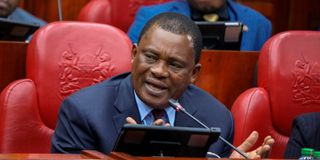Nothing wrong with Ruto's taskforce on Shakahola deaths, says AG Muturi

Attorney General Justin Muturi.
Attorney-General Justin Muturi has defended the move by President William Ruto to form a commission of inquiry and a taskforce in the wake of the Shakahola mass deaths.
Mr Muturi said the Head of State is within the law and the two processes will not undermine the mandate of a Senate ad hoc committee earlier formed to inquire into the deaths which have surpassed the 200-mark.
The President has come under criticism from different quarters over the decision to form the commission and the taskforce with accusations that the move undermines independent constitutional commissions and other independent offices in executing their work.
Azimio leader Raila Odinga has challenged the formation of the commission of inquiry in court, arguing it is unconstitutional and that the Kenya Kwanza regime cannot be relied upon to investigate the deaths as some powerful individuals close to the President are involved in the mass killings.
On the other hand, some members of the ad hoc committee chaired by Tana River Senator Danson Mungatana have contended that the decision to form the commission and taskforce is meant to undermine the work of the Senate.
However, Mr Muturi rejected the notion that the mandates of the two processes will overlap, saying the decree of each of the two processes was well thought out and clearly delineated from each other.
“Parliament has the mandate of the people, so is the President. The President processes should be allowed,” said the AG. “Just like other elected leaders, President Ruto is answerable to the people so there is no justification for anyone to question the President for setting up the two processes.”
He explained that the terms of reference of the commission is specific to the deaths in Shakahola with a view to establishing what led to the deaths.
On the other hand, the terms of reference of the taskforce will go beyond what happened in Shakahola by addressing the entire gamut of issues surrounding the registration and regulations of religious organisations.
“The Investigation will inform of an inquiry where it is expected to make recommendations to the President,” said Mr Muturi.
President Ruto attracted public furor when he formed a commission of inquiry and picked Appellate Judge Jessie Lesiit as its head.
He followed this up with the appointment of a taskforce to be chaired by former Gachoka MP Mutava Musyimi.
The two moves came after the Senate had approved a motion by Kakamega Senator Boni Khalwale calling for the setting up of an ad hoc committee.
Consequently, there has been a feeling within the committee that the decision by the president to form the two processes was a cover up meant to undermine the work of the ad hoc committee.
Mombasa Senator Mohamed Faki said besides being unconstitutional, both the taskforce and the Commission had similar terms of reference, whose aim was to undermine the role of the offices of DPP, the Police and other investigatory agencies.
He said the mandates of both the commission and the taskforce are similar and to a large extent mirror those of the Ad Hoc committee.
“It does not augur well that at the time when the country is in the throes of financial crunch, we put parallel processes to use the funds which are limited,” said the Senator.
Critics believe that the task force or the commission route routes aimed to defeat the ends of justice, arguing the government should have waited for the parliamentary processes to end and see what will come out of it before making the final decision.
Nonetheless, Mr Muturi contends the taskforce will have a closer nexus with the work of the committee and that of the commission of inquiry.
“The taskforce has a great bearing on what will affect the whole country as it will enrich the work of the parliamentary process and make recommendations on the registration and regulation of religious organisations,” he said.





